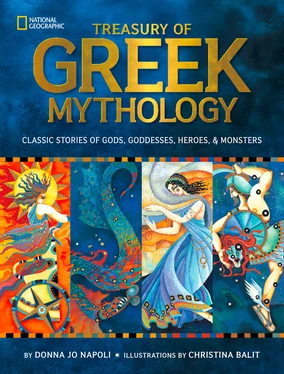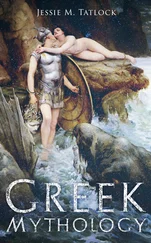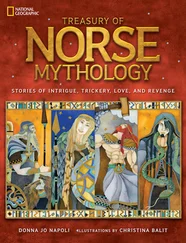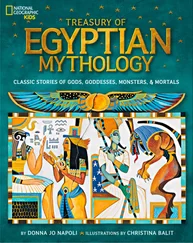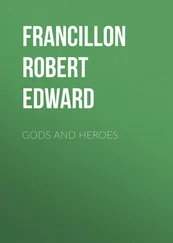Christina Balit - Treasury of Greek Mythology - Classic Stories of Gods, Goddesses, Heroes & Monsters
Здесь есть возможность читать онлайн «Christina Balit - Treasury of Greek Mythology - Classic Stories of Gods, Goddesses, Heroes & Monsters» — ознакомительный отрывок электронной книги совершенно бесплатно, а после прочтения отрывка купить полную версию. В некоторых случаях можно слушать аудио, скачать через торрент в формате fb2 и присутствует краткое содержание. Жанр: unrecognised, на английском языке. Описание произведения, (предисловие) а так же отзывы посетителей доступны на портале библиотеки ЛибКат.
- Название:Treasury of Greek Mythology: Classic Stories of Gods, Goddesses, Heroes & Monsters
- Автор:
- Жанр:
- Год:неизвестен
- ISBN:нет данных
- Рейтинг книги:3 / 5. Голосов: 1
-
Избранное:Добавить в избранное
- Отзывы:
-
Ваша оценка:
- 60
- 1
- 2
- 3
- 4
- 5
Treasury of Greek Mythology: Classic Stories of Gods, Goddesses, Heroes & Monsters: краткое содержание, описание и аннотация
Предлагаем к чтению аннотацию, описание, краткое содержание или предисловие (зависит от того, что написал сам автор книги «Treasury of Greek Mythology: Classic Stories of Gods, Goddesses, Heroes & Monsters»). Если вы не нашли необходимую информацию о книге — напишите в комментариях, мы постараемся отыскать её.
Treasury of Greek Mythology: Classic Stories of Gods, Goddesses, Heroes & Monsters — читать онлайн ознакомительный отрывок
Ниже представлен текст книги, разбитый по страницам. Система сохранения места последней прочитанной страницы, позволяет с удобством читать онлайн бесплатно книгу «Treasury of Greek Mythology: Classic Stories of Gods, Goddesses, Heroes & Monsters», без необходимости каждый раз заново искать на чём Вы остановились. Поставьте закладку, и сможете в любой момент перейти на страницу, на которой закончили чтение.
Интервал:
Закладка:
Then came a constriction so tight and forceful, Hestia screamed, there in the place with no air. Silent and pained, she screamed and screamed until her throat was raw, and she was pushed up and up and out. She lay, disgorged on the ground, with brothers and sisters and that one stone, blinking at the rude light of day, shrinking from the edginess of the noises carried through the air, wet and shivering and shocked to be separate from the four other wiggly bodies and the lump of a stone.
GENTLE Goddess
Hestia is a mysterious figure; she appears only as the goddess prayed to about family matters. The ancient Greeks seemed to hold family concerns private, separate from the usual squabbles of their stories. The earliest records of family law in Greece are the codes of Gortyn in Crete in 450 B.C., which concern finances; they don’t tell how an ordinary family should behave at home. Probably the father ruled, given how royal households in Greek mythology behaved. But that’s just a guess.
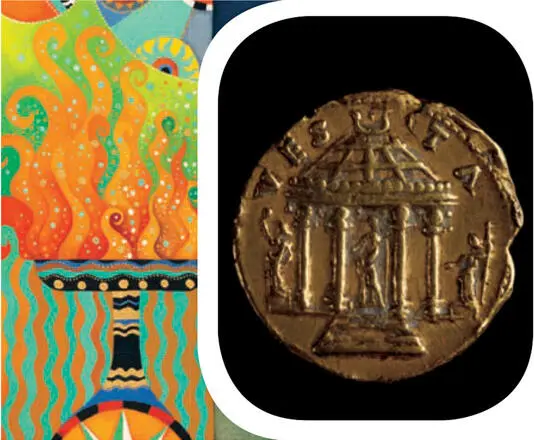
A temple dedicated to Hestia, illustrated on an ancient coin
Her brother Zeus had freed them, strange thing that he was, all tanned and muscular and accustomed to everything Hestia found so foreign. He freed them, only to tell them they must fight at his side against their father Cronus and his sister and brother Titans. Rocks, spears, axes. Shouts, cries, howls. Freed into a war? This was freedom? Was the world insane?
Hestia cringed. She picked up rocks in both hands and feigned interest whenever others watched her, but, fortunately, they rarely did. She climbed trees and peeked through their thick foliage, hoping for a glimpse of her mother Rhea, of the arms that had never cradled her, the hands that had never caressed her. She built a mound of stones with a pit in the middle and sat there hidden, wondering when the sweat and blood and tears would ever stop, and, if they did, who she would then be. For up to this point, she had been no one, really.
And then it ended. But not because the animosity had run its course. No. It ended because her brother Zeus got the help of strange men with fifty heads and a hundred arms, and because other strange men with a single eye in the middle of their foreheads gave Zeus the lightning bolt—the great cheat. That’s how the war ended—with one side getting a weapon the other had no equal of. Cheat cheat cheat.
Hestia’s brothers were impressed with Zeus’ power. Poseidon was only too happy to rule the seas, Hades was only too happy to rule the Underworld, and both were only too happy to leave the rest to Zeus.
Hestia’s sisters were impressed with Zeus’ tanned skin and muscled legs and arms and chest and back. Each looked at him with flirty eyes.
Only Hestia saw Zeus as a frightful maniac. She kept her distance from him and all other males, like a shy spider.
She looked everywhere, and she saw the families the Titans had formed over the years, and she saw the families their children were forming and the families their grandchildren were forming, and she saw a kind of love that made her ache. They sat around the hearth eating and talking and teasing with one another. They hugged and laughed. That love—that was what Hestia wanted to foster in the world. And so Hestia became the goddess of hearth and home, and in her quiet, still way she finally banished the fear from her heart and found a gentle, soothing peace.
Ancient Greek families took consolation from knowing Hestia watched over their daily home life in the gentlest of ways. And Hestia found peace in giving that consolation.

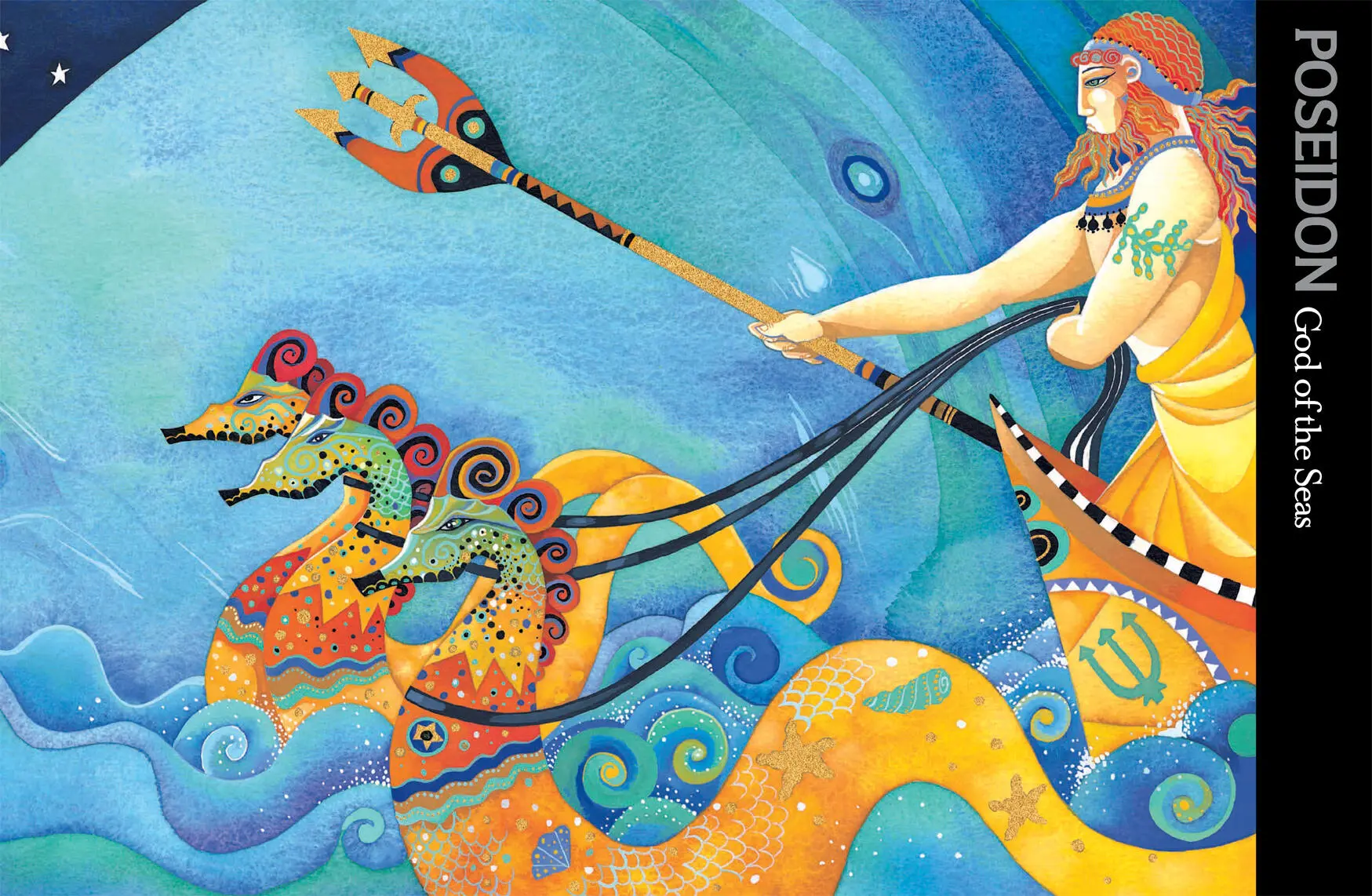

Poseidon, along with his brother Hades, and his sisters Hestia and Demeter and Hera, was swallowed at birth by his father Cronus. Then a sixth child, Zeus, who was never swallowed, and thus had never known humiliation, freed them. Poseidon sized things up: Zeus was a force to be reckoned with—that was the guy to follow.
For ten long years, the six brothers and sisters fought their father and aunts and uncles—the mighty Titans. It was a nasty war, but what war isn’t? Poseidon gritted his teeth and did his part. He was no coward, after all. He donned armor and went dutifully into battle. He never lagged.
But now and then there was a lull in the battle, perhaps because Zeus got distracted or because the Titans, despite their huge size, needed a rest. Who knew? No one ever explained things to Poseidon. Whatever the case, Poseidon was grateful, and in those moments he took refuge in visiting Pontus, the ancient god of all the waters, the partner to his grandmother Gaia, Mother Earth, and his grandfather Uranus, Father Heaven. He swam in Pontus’ waters, and, despite how badly his life had gone so far, despite all the time locked up in his father’s belly, despite all the long years of savage war, he was happy. He found joy in the buoyancy of diving whales, he found beauteous rhythm in the undulating wake of eels, he found humor in the scuttling of crabs.
Best of all, Poseidon found a friend in the oldest son of Pontus and Gaia. His name was Nereus, and he loved the watery depths as much as Poseidon did. Together they plunged to the corals and sponges that lived on the seabed. They rode on the backs of turtles. They flapped their arms like the rays they followed, then let them hang with their legs moving at the whim of the currents like the tentacles of the nearly transparent jellyfish.
But then it was back to war, until the glorious moment when the hundred-handed sons of Gaia joined the battle on Zeus’ side, and then the Cyclopes gave Zeus the thunderbolt and Hades the helmet that made him invisible and Poseidon the trident. It worked, that trident. It worked splendidly. Poseidon struck it on the ground and the earth shook, boulders tumbled to the sea, rivers overflowed their banks. Ha! The Olympian gods won.
And Zeus appointed Poseidon ruler of the seas. Poseidon knew his brother felt the seas were an inferior realm to rule. Ha again! Nothing could have pleased Poseidon more.
WATER Gods
Many gods ruled the waters beside Pontus, Nereus, and Poseidon. Poseidon’s son Triton trumpeted the noises of moving water. His son Proteus changed shape at will—as seas seemed to do to the ancient Greeks. The Titan Oceanus was a continuous water loop: the connected system of the Earth’s five oceans. Then there were saltwater nymphs (Nereids), freshwater nymphs (Naiads), and three mortals who became sea divinities. The variety of gods may reflect ancient Greek knowledge of the complexities of the water systems.
The sea god Triton at the Trevi Fountain in Rome
With his black mane flying out behind him, he swam the seas in search of those who might need his help. It was a welcome antidote to that tedious war. And when he wasn’t patrolling, he let himself be absorbed in the watery mysteries.
That’s when he discovered the finest mystery ever. She was the granddaughter of Pontus and Gaia, and the daughter of the lordly sea god Phorcys and the lovely cheeked sea goddess Ceto. That heritage made her the perfect wife in Poseidon’s eyes. She was one of three sisters, called the Gorgons. The other two sisters were immortal, like the gods. But Medusa, as she was called, was mortal.
Читать дальшеИнтервал:
Закладка:
Похожие книги на «Treasury of Greek Mythology: Classic Stories of Gods, Goddesses, Heroes & Monsters»
Представляем Вашему вниманию похожие книги на «Treasury of Greek Mythology: Classic Stories of Gods, Goddesses, Heroes & Monsters» списком для выбора. Мы отобрали схожую по названию и смыслу литературу в надежде предоставить читателям больше вариантов отыскать новые, интересные, ещё непрочитанные произведения.
Обсуждение, отзывы о книге «Treasury of Greek Mythology: Classic Stories of Gods, Goddesses, Heroes & Monsters» и просто собственные мнения читателей. Оставьте ваши комментарии, напишите, что Вы думаете о произведении, его смысле или главных героях. Укажите что конкретно понравилось, а что нет, и почему Вы так считаете.
